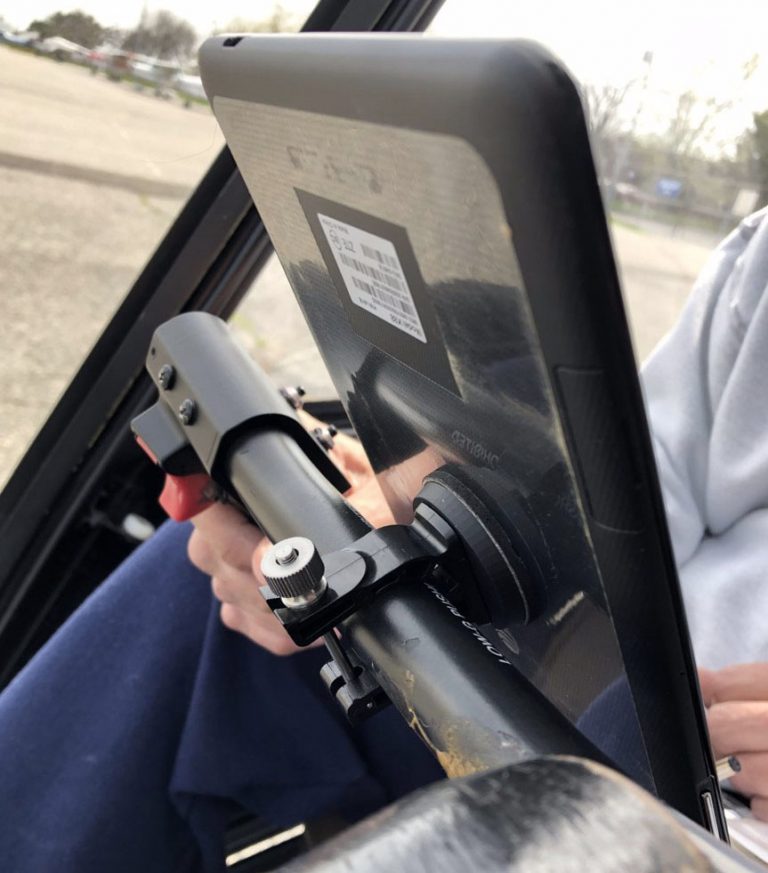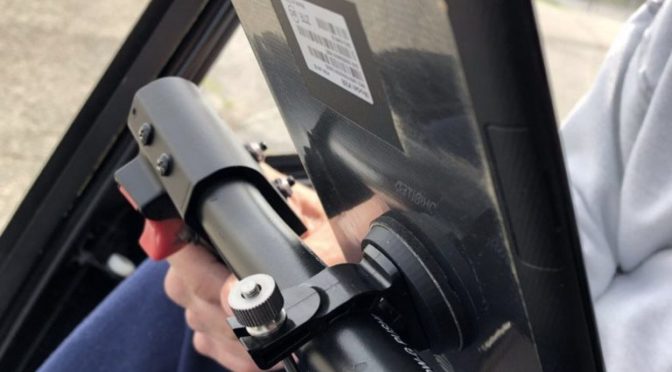
iPads are changing how helicopter pilots fly, with affordable obstacle alerts, custom helicopter approach charts, and in-flight weather finding their way into more and more cockpits. Where to mount a tablet in a helicopter, though, is a tricky question since the pilot typically has both hands on the controls at all times and there is no yoke to use for mounting as there is in an airplane. The high vibration environment can also pose some unique challenges. Here’s our advice.

The most universal option is the good old suction cup mount. One thing helicopters have a lot of is glass, so there is usually a convenient part of the side window or windshield to attach the suction cup to that will keep the tablet in the pilot’s view. The standard RAM Mount kits work well, as do the Robust Suction Cup kits. It helps to keep the window clean and to find a relatively flat part of glass for the suction cup, but we have not had any issues with a suction cup failing in flight. If you are concerned about this, the double suction cup mount is an option.
Actually, our favorite mount in a helicopter is the Robust Suction Cup Mount for phones. It holds tight to the window, the phone is a convenient size in a helicopter, and the spring-loaded cradle is easy to operate with one hand. On a long cross country, this is the perfect setup, and most modern EFB apps offer a full-featured version for smartphones. One additional tip on suction cup mounts: shorter arms will generally reduce the vibration, especially if you tighten up the joints well. So if you’re having trouble with a shaky screen, you might opt for the shorter arm length.
For mounting on the cyclic, the new Box Elder system is simple but ingenious. It uses a simple plastic piece that securely fits around the cyclic bar in a Robinson R22 or R44 helicopter, then screws tight with a small thumbscrew. Once the bracket is attached, a variety of add-ons can transform it into a timer mount, GoPro mount or phone/tablet mount.

The $11.99 disk attachment accessory is the best option for electronic devices, but it does require two-sided tape or velcro (there is no cradle for phones). The bracket itself is $19.99 so the total system costs less than $35, a fair value. In our experience, the bracket is both lightweight and sturdy, so it’s not going anywhere. However, a full-size iPad will probably interfere too much to be used in everyday flying.
Finally, kneeboards are a great choice for helicopters, although we believe simpler is better. A bulky kneeboard can quickly get in the way of the controls – a bad situation in a five-foot hover. Two of our favorite options are the Flight Gear Rotating Kneeboard and the MyClip. Both of these hold the iPad securely on your leg, which is the most important feature, but they won’t get in the way.
Whichever solution you choose, make sure you spend some time testing it on the ground before you go flying. With a little experimentation, an iPad can be a valuable addition to any helicopter, but you want to make any mistakes on the ground, with the rotor blades stopped.
The post How do I mount my tablet or phone in a helicopter? appeared first on iPad Pilot News.
Source: Ipad appsHow do I mount my tablet or phone in a helicopter?
